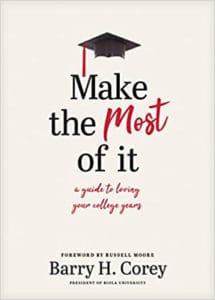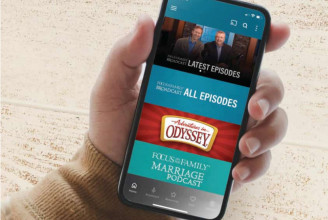John Fuller: So, the new normal – is this it or is there something else? And how long is all this going to last? It affects all of us, especially those who are planning on returning to college. Um, I’m John Fuller, along with Jim Daly. This is Focus on the Family and here are some comments that we had from some interns that spent some summertime here with us. They offered these thoughts about going back to school.
Intern 1: All my classes are online and it’s very stressful. I just don’t know how I’m going to do it.
Intern 2: The only anxiety I have about not returning to school is potentially losing out on a good semester of making friends and building relationships through college.
Intern 3: I was supposed to graduate summa cum laude. But my graduation ceremony got canceled.
Intern 4: I was super excited to go back to school and participate in theater this semester, but now we don’t even know if we’re gonna be allowed to perform.
Intern 5: You know, this will be my last semester and this will be my senior year. And it’s kind of sad.
John: Well, today we’re going to be offering some hope and encouragement for college students and their parents on this Focus on the Family broadcast.
Jim Daly: John, college can be a really exciting time. I remember those days. There are fun times, great classes, meeting great friends – friends that I still have today. And then there’s the stress. The normal stress of going to university and not knowing if I’m in the perfect will of God. Is this what I’m supposed to do? And I’m not really doing well in this class. Should I drop it or take it again? Whatever it might be. Those are the normal things. And now we add this pandemic to the whole equation and young people are thinking, wow, is it time to just take a step back, maybe not go to college right now? Or if I go, am I going to get some value out of this that goes, you know, back to normal? So, we’re hitting this topic today with a wonderful friend. And in fact, I’ve got two boys right now, a senior in high school, and I’ve got Trent, who’s a sophomore in college. So, this really is right where I’m living today.
John: Yeah. A lot of parents have felt this in the past. It’s just so much more complex as you’re indicating. And we have Dr. Barry Corey with us to discuss this. He’s the president of Biola University, has been since 2007. He’s a former pastor and the dad of three college educated kids and has written a great book called Make the Most of It: A Guide to Loving Your College Years. And, of course, we have that here at focusonthefamily.com/broadcast.
Jim: Dr. Corey – Barry, my good friend. Welcome back to Focus on the Family.
Dr. Barry Corey: Thank you, Jim, it’s always a pleasure to be with you even if it’s virtual.
Jim: Okay. I’m always saying you to me are the funnest college president I’ve ever met (laughter).
Barry: Oh!
Jim: Where do you – where do you find that spring of joy as you’re managing – I mean, Biola in Southern California. How many students do you have?
Barry: Uh, we have 6,000 students. And that’s…
Jim: It’s a big school.
Barry: …That’s where my joy comes from, I think.
Jim: Yeah. And you do such a remarkable job. And so, you know, I’ve never really said that so publicly, but I love who you are and what you do. I’ve witnessed it. I’ve been on the campus as you’ve interacted with those students. And it’s awesome the way the kids come to you and trust you and talk with you and the way you turn your full attention on them. I mean, I saw it and I just think it’s a good model for all college presidents to be more like Barry Corey.
Barry: Mm. Well…
(LAUGHTER)
Jim: Hey, let me – let me start with the condition of young people today, emotionally and spiritually. Where do you think things are at? You are interacting with a lot of young people. What’s your assessment of how they’re doing?
Barry: Yeah, well, if you’re talking about today being, um, covid today or today being just this kind of rising generation of students. Um, this is this is a season that they didn’t prepare for and this is the – probably the greatest global crisis that they’ve ever experienced and maybe ever will. So, I see this as a time for – for students to, like, both deal with their anxieties and try to figure out where their hope is. There’s a profound uncertainty right now in this generation. And, um, you know what – will I got a job? Um, you know, will I make it through college? And I heard your interns like – like what’s college going to be like? That one study students that studying theater. I mean, it’s hard to do theater when you have to keep a six foot distance and wear a face covering – right?
Jim: Yeah.
Barry: So, there’s just a lot of profound disappointment, um, that this generation is facing. But there’s never been a better moment to rise above that and take this crisis and turn it into this generation’s like moment to – to rise up.
Jim: No, it’s so true. You know, often as parents, we talk about walking uphill to school, both directions, that kind of thing (laughter).
Barry: Mm hmm.
Jim: You know, that there’s nothing new under the sun. But this does feel like a very unique environment. I mean, it’s been about 100 years since a pandemic had gripped the – the world. It is different, isn’t it?
Barry: Yeah, it’s different and obviously it’s hard not to be in physical community. That’s what, you know, the traditional college experience is like. Granted, there’s lots of new technological developments where we’re doing things in more hybrid fashion and, you know, digital connectivity. But – but actually being there and – and eating together on a table and going on retreats together and sitting in the office of the faculty member to be mentored by that person and just hanging out late in the residence halls and just kind of pondering the bigger issues of life that happens in this higher education culture that we’re so used to. And, granted, there are a lot of things that are changing. But what’s being missed right now – and I hear from our students is like – like we want to – we want to be together. We want to be in community with each other. And then that’s what is their greatest disappointment right now.
Jim: Yeah. I want to get to that in a minute about how we’re built for relationship. But before we do, when we – when we, um, look at the situation, the pandemic, everything that we’re encountering with it, you are challenging students to see this as a moment to apply virtue versus considering it a curse. Now, I think you’re going to split the audience here right down the middle. But how do we as Christians see this as a moment to put virtue on display?
Barry: Yeah. So, I mean, granted, this is the first one we’ve had like this in a century, um, but it’s not the first one that Christians have ever gone through.
Jim: That’s true.
Barry: And – and I know if you, um – if you read the history of calamities and plagues and catastrophes that our world has faced, it’s – it was often the rising generation of Christians that, like – that – that kind of rose up to the occasion and began to show, um, compassion, not just on their brothers and sisters in the faith, but on pagans, on those folks that, like, didn’t believe and were maybe antagonistic to – to, um, what they what they believe. So, it’s certainly – Jim, it’s a hard season for college students right now. It’s foggy. No one knows when it’s going to end. Students are facing, like, financial issues and health issues and uncertainties about college. But this is – when we talk about virtue – this is an opportunity for students to see these constraints as a virtue and not as a curse. And so, you know, here in my role at Biola, I want this moment, um, that life has given this rising generation of Christians. That one, that they focus not on what they’ve lost, but really how much they’ve gained through this. And I think that is a perspectival issue that – that students need to begin to think about. So, you know, when Paul talks about, like, you know, suffering brings about perseverance, perseverance brings about character, character brings about hope – to get from suffering to hope there are those way stations along the way and what is it like for this generation to understand? What is it mean to persevere? And how is character development happening? And we shouldn’t ask students to take a Disney fastpass – right? – from suffering to hope without dwelling in perseverance and character building. And this is a moment for them. I mean, I think this is the best time to be in college. And obviously, from my perspective, the best time to be at a college that has, like, a deep faith foundation because, you know, here we are. What are you gonna do to restore the sick and help those who are poor and homeless and times of oppression, educating the illiterate? All of those things have happened over the years with the rising generation. And it can happen again right now in community with students, even if it’s a virtual community. So, I see this as a great opportunity, the best time to be in college, and maybe even especially in a Christian college right now is today.
Jim: No, I appreciate that very much, because I think – I think as Americans, we struggle with understanding that Biblical formula – how we get to hope through adversity. And what a great reminder and it’s just like the Lord to put us through something, to get us back to our – as Christians, as our core values. Right?
Barry: Right. Exactly.
Jim: And it’s – it’s – it’s a great discipline and one that usually modernity and materialism kind of masks for us. We go after the stuff, the shiny stuff, and we forget the character building that you’re referring to. And I – that’s why I have great hope for this younger generation. Let me address something that we’re seeing in the news quite a bit. And it’s related to covid, but I’m sure you’re seeing it on the college campuses, too. This rise in depression and anxiety in young people. This is something you experienced personally. You address it in the book. Speak to the environment there. I mean, college causes you a bit of anxiety anyway. I’m not performing at the level I want to. I’ve got, you know, whatever problem I’m having. So, there tends to be a lot of anxiety in that environment. But how is it even worse now? And how do you use a college president – how do you address your students to be mindful of their mental health?
Barry: Yeah, that, I mean, already there are, you know, in this generation of students, significant, you know, mental health challenges that they’re facing and then obviously exacerbated – right? – by covid. So, I mean, I in – this book is just like a lot of practical advice to students on how to manage the, um – the weight of college. And when I went to college, I – I was telling you a little bit earlier I was an introvert, um, still am to a certain degree, and it was very hard for me to kind of feel like I was fitting in. I traveled halfway across the country. My parents put me on a plane, you know, somebody picked me up and there it was. You know, plunked right into the middle of a college with people I didn’t know.
Jim: Right.
Barry: And I would, you know, go to the cafeteria and sit there, like, by myself. And I didn’t have a phone look at (laughter), right? So, I’m just like – I’m looking at people wondering, you know, what they’re thinking of me by – you know, all alone there. But I – it took me a while and – but I realized there were a lot more students like me than, um, maybe were willing to admit it. I think there’s an imposter system – syndrome that some students feel like they want to project the fact that they fit in. But it just takes a while and it’s jarring and take the long road and – and allow yourself to settle in. It takes time. It took me three semesters, Jim, before I felt like, okay, I’m really kind of getting the groove of college and – but it’s got to be patient with yourself and look at things in – I think in increments.
Jim: Well, and, you know, somebody who knows you now like I do – I didn’t know you when you were a college student – and I don’t see that person, that isolated person, eating lunch by themselves in the college cafeteria.
Barry: (Chuckles)
Jim: I mean, I’m baffled by that because I just don’t see that. But let me just get practical for that minute. How did you come out of that? What did you do to say, okay, I’m going to go meet friends? What…? And then were you accepted in that context and did it start rolling in a positive direction for you?
Barry: Yeah. I remember being at a basketball game on a Saturday night sitting next to Brian. Brian was very popular, outgoing, played football and was student body or class president, whatever he was.
Jim: (Laughter)
Barry: And – and at this game, Brian turns to me and said, “Hey, Barry, I’m going to a birthday party after – after the game tonight, do you want to come with me?” And, like, my hands, Jim, they started to sweat.
Jim: (Laughter)
Barry: And I thought, like, what if I go and no one talks to me? And what if I get stuck there and I can’t come back…
Jim: Oh, man.
Barry: …Because I don’t have my car? And I said “Now, you know, Brian, I’m not going to go.” I’m I lied about something. “I’ve got a paper due.” And I remember I walked back that long, lonely sidewalk to the residence hall that Saturday night and about halfway down I just had like this metamorphic moment and I said like, “No, I’m going to go.” So, I – I turned around and, like, headed right towards the parking lot where hopefully I’d find him in his car. And there he was in his Volkswagen Sirocco, if you remember what that is.
Jim: (Laughter)
John: Yeah.
Barry: (Laughter)
Jim: A cool car.
Barry: And it…
John: They were sporty.
Barry: Yeah. Yeah. That’s right. And I banged on his window and I said, “Hey, Brian, I think I’ll go to the party.” And he looked in the backseat and there were three people in his backseat, and he said, “You know, hey, sorry, but the car’s full.” And I – my heart sunk, and I thought, you know what? Even when I try, I still fail. And then someone in the backseat said, “No, no, come on. We’ll make room for you.”
Jim: Oh, wow.
John: Ah.
Barry: And, uh, they made room and I went. And that night, things changed for me. Again, it was my third semester in college. And, you know, I had to step out of my comfort zone. I had to risk failure. I had to do something that for me was, like, really hard to do. But somebody also had to say, you know, “Get in the car. We’re going to make room for you.”
Jim: Right.
Barry: It took both of those dimensions in college – my willingness to – to push myself beyond what I was comfortable doing and somebody else to say, “You know what? Come on. We need you. We want you.” You know, so for those of you who are extroverts, look for the people like me…
Jim: (Laughter)
Barry: …In college who are like walking lonely down the sidewalk, sitting by themselves in lunch and welcome them in. And for those of you who are sitting by yourself at lunch and walking lonely down the sidewalk like take a chance. Try something. Try out for a play or, you know, run for office or play intramurals or do something that maybe is a little bit hard for you to do. And it might not work out and you might fail, but fail well.
John: Hmm.
Barry: College is a great place to fail, by the way. Fail well…
John: Hmm.
Jim: Yeah. We’ll talk about that a little more for now (laughter).
Barry: Okay. All right.
(LAUGHTER)
Barry: I’ve got lots of stories about that. So, anyway that’s a – that’s a little bit of my own odyssey on how I navigated it, but that’s – it’s timeless. I see that happening to students today.
Jim: Yeah.
Barry: And it just takes time for some students to really feel like they’re part of this community. But when they take the long road, they tend to be like the strongest leaders I’ve seen on campus.
Jim: Well, and I so appreciate that. That’s very, very good to hear your story.
John: Hmm. This is Focus on the Family with Jim Daly. And our guest today is Barry Corey. He’s the president of Biola University and he’s written a book called Make the Most of It: A Guide to Loving Your College Years. And, uh, we have copies of that. It’s a great resource for parents and students. Stop by focusonthefamily.com/broadcast. Or give us a call. Our number is 800, the letter A and the word FAMILY.
Jim: Hey, Barry, uh, I want to kind of go a little further now in this pandemic situation. One of the interns told us that – and this is a paraphrase – she worried about sinking into depression since she’ll be home alone, doing her coursework online, everything from an isolated perspective. I don’t know at Biola or if in the Association of Christian Colleges, you’ve had a discussion about this, but speak to that issue, that very issue you’re talking about, and how the environment now is actually isolating students to the point where depression can set in because they’re not getting relational feeding, if I could say it that way.
Barry: Right. Well, I think the way the spring semester ended on virtually all college campuses is like this abrupt pivot. Students went home. It was, like, stunningly disruptive. And then…
Jim: Yeah. Even some dorm rooms weren’t even cleaned out. I know a couple of my friends, they had to go back to get their stuff couple of months later.
Barry: It was – yeah. It was – yeah. That happens across campuses big and small, public, private. It was just this sudden change. But I think colleges are much more prepared now than they were in the fall for the flexibility. Um, I think you’ll find that with your faculty. So, I would encourage parents to encourage their students or students that are listening to this, is that that the co-curricular part of your education is going to be there. Um, there going to be ways to be involved in clubs and organizations on your campus this semester, even if you’re not physically there. There are spiritual formation and – and chapel programing that you’re going to have access to that maybe you didn’t in the spring. Um, there’s, um, student development and an intern networking and career placement and learning center -all of those are going to be at your disposal. And places like Biola, we have student coaches for new students coming on board. If they don’t start right away, we’re actually starting remotely until we get the green light from the state of California to begin to phase students back. In the meantime, our faculty and our students are reaching out to new students and we’re forming small communities. So, it’s not going to be as bad as it was in the spring, um, but it’s not going to be completely what it would be if students were here. But I think that students should see this as more of I’m just going to sit on a Zoom class and then not be participating in anything else. There are lots of other dimensions of college life co-curricularly that you can participate in and – and you should look for those opportunities and you should initiate those opportunities as well.
Jim: Well, it’s similar to what you just said before that break that, you know, you can’t sit at the table alone. You’ve got to find a way to meet people and – and go. And, you know, this could be a really downward spiral if you do sit at home and you’re on the virtual class and you don’t get out. Find ways to connect really is what you’re saying. Hey, let me go back to the fail well, because I’m – you know, I did pretty good in school and high school was pretty easy. So, when I got into a foreign language class, I really didn’t think I needed to go to the lab at college…
Barry: (Laughter)
Jim: …Because, you know, high school Spanish was so easy (laughter). But I had to take that class again. It didn’t feel like failing well. It felt expensive to me.
(LAUGHTER)
Jim: So, what do you mean by failing well? Please teach me.
Barry: Well, yeah. Well, I’m teaching myself. I’d – so, I failed plenty of times in college. And I felt like I just – you know, I wasn’t assertive enough going on. I – I tried running for office my freshman year and, like, I got clobbered it wasn’t even, like, close. And I think I’ve learned since then – I wish I knew it now – when that failure happens to ask the question, um, not why did this happen to me, but maybe why did this happen for me?
Jim: Huh.
Barry: Um, and that’s been helpful for me that, again, college is a great place to try things that you’ve never tried before, but don’t overdramatize your failure. There’s a phrase that I use in the book that I’ve picked up from, um, this NYU social scientists named Jonathan Haidt. You might have read some of this stuff. He’s amazing writer. Um, and it’s called “catastrophizing.”
Jim: Yes.
Barry: That means like making something worse than what it really is. So, you’re a student at – you know, in your college and you – and you fail a quiz. And you say, “Oh, I failed the quiz. I’m probably going to fail the midterm in this class. I’m probably going to fail the class and because I failed the class, I’m probably going to drop out of college. I’m probably going to live with my parents rest of my life.” Because you failed the quiz, right?
Jim: Right?
Barry: So, that’s the catastrophizing that we just reject. Like how this one thing that didn’t work out so well, it’s like – it’s a metaphor for the rest of my life. And I think that’s what we need to kind of like move beyond and – and just take that failure and realize I’m going to do some fine tune adjusting, get some practical advice, some help from, you know, services on your campus, a mentor, some students that kind of encourage you. Just – so take these small failures with a grain of salt and don’t think that a small failure is going to end up, like, crescendoing to just, like, this epic failure of you as a human being.
Jim: Yeah.
Barry: You are not a failure. Maybe something that you did didn’t work out, but that doesn’t mean you are a failure. And so, keep on giving yourself permission to try something new. You are incredibly gifted students. You have these talents that are maybe like below the surface that that come out when you try things. And “Ah! Finally I found something – like I actually can paint.”
Jim: Yeah.
Barry: “I never paint before. I’m a business major.” So, I just think those are the things that you’ve got to keep pushing into.
Jim: Um, you also speak about “irri-tainments” in your book. And I think I get that. But it’s that distraction and that’s why this is a good place to mention it. You know, I’m the dad of two boys. And certainly one of the things that they find very entertaining is gaming. And I know you have a lot of college students coming into the college experience who are spending too much time with gaming and other things. So, what – what are you getting at with irri-tainments?
Barry: Yeah. You know, irri-tainments are, like, things that you do entertain yourself that are ultimately irritating to your soul. Um, okay, we have students that play video games that – you know, we have students that, you know, binge watch Netflix. And, like, I’m not saying, you shouldn’t do that. But what I think you need to do is just, like, look at your own self-control in college and make healthy choices, know your limits, set your boundaries. It’s not just watching countless hours of Hulu. Um, and it’s not just like playing video games until 3:00 in the morning. Those are, like – like, bad choices to make, but doesn’t mean you can’t play video games or watch something on – on your streaming videos. But I think it in college is also the real danger in many colleges of this culture of binge drinking and hookup culture. And unless you really set your boundaries ahead of time and have some kind of accountability on the decisions that you’re making, it’s going to be really hard. And I think that it’s easy to get swept in that, but you don’t need to go to a party to succeed. Chances are the next morning most people aren’t going to remember what happened at the party anyway, right?
Jim: Yeah.
Barry: So, if you have a second, I – there’s a – there’s a little quote of a book – this book I’d like to read. It’s, um, from my friend Myron. Myron, um – I was on the phone with them this morning. For 18 years, we’ve been, like, prayer partners, like once a week we – he’s back in Boston and he graduated from Harvard. And here’s how he talks about his first day at Harvard. So, he had just begun as a freshman. He was committed to deepening his faith in college. He said in order to do this, he’d need to put his mind and heart into it. And he told me the very key moment for him came his very first night in the residence hall there in Cambridge, Massachusetts, at – at his first night as a freshman at Harvard. And here’s what wrote, and he told me to put this – you know, I could use this in the book. He said, “That’s when I really began to sweat. These guys, partying freshmen, came into my room and I had a bookshelf and I had shelved my library. Prominent titles included Josh McDowell’s Evidence That Demands a Verdict. My Utmost for His Highest by Oswald Chambers. And the real mother lode. John White’s Eros Defiled, an exploration on sexual purity. What if these drunken freshmen in my room found these books? And they did. ‘Whose books are these?’ My roommate disavowed any ownership. ‘Hey, look, a Bible.’ One of these guys pulled it off the shelf and with a mock preacher voice began reading a random text. Quote, ‘I’ve learned the secret of being content in every situation.’ There was some laughter. He continued. ‘Whether well-fed or hungry, whether living in plenty or in one.’ Gradually, as he read, his tone changed back to his own voice. He slowed his reading and with all the sarcasm gone, quietly finished with ‘I can do everything through Him Who gives me strength.’ He stopped reading and there was a silence in the room. An eternity of silence. Finally, one of the others said softly, ‘Well, I guess we should get going.’ And they all walked out, shutting the door behind them.” And then Myron says this, “At that moment, the Holy Spirit brought one verse to my mind in the language of the King James version, no less. “Choose you this day Whom you shall serve.” Bang. Joshua 24:15. Right out of the gate, God was putting the challenge down. That first night, lying wide awake in a Harvard bed, having just witnessed the power of Scripture to render a bunch of my alcohol lubricated classmates silent, I replied that by His grace I was gonna serve Him.”
John: Hmm.
Barry: It’s making those decisions at the beginning of your time. This book is written for. Jesus following college students. You might be at a public college or private or Christian or not or suburban or rural, big or small. But college is a time where students – as you know, between 18 and 22, they develop more relationally and psychologically and spiritually and intellectually. And this is such a precious time in the life of a student that I covet the opportunity for all students to be able to say, like – like, “I’m going to make some good choices in college and, sure, I’ll make mistakes along the way, but I’m going to, like, really prepare myself to make the most of my time in college.” And part of that is saying, you know, “I’m going to choose this day Who I’m going to serve.”
Jim: Man, Dr. Barry Corey, President of Biola. We couldn’t end this any better.
John: Yeah.
Jim: I mean, you just put the exclamation point on it all with that story. And I so appreciate you taking time. If possible, um, I know we’re going to end here for the broadcast and the podcast, but maybe we can go a little longer online and folks can join us? I have got a couple of more questions and then we have some interns that will ask a couple of questions. Can you hang with us and we’ll go online for a little extended time?
Barry: Yeah.
Jim: All right.
Barry: For Jim Daly I would do about anything.
(LAUGHTER)
Jim: All right, great. Let’s do that. Thanks for being with us, Barry.
Barry: Oh, yeah. Great to be on Focus on the Family, Jim, and I, you know, wish God’s best on all of the work that you’re doing as well.
Jim: Thanks so much.
John: And once again, Dr. Corey’s book is called Make the Most of It: A Guide to Loving Your College Years. We do have copies of that here. Give us a call. 800, the letter A and the word FAMILY. Or stop by focusonthefamily.com/broadcast.
Jim: John, let me just reiterate, as a father of a college student and a soon to be college student, I want to encourage people to get a copy of this. This is a great resource for your young person to have and for you as a parent to have some dialog with. So, if you can make a gift of any amount – and if you can’t afford it, we’ll get it in your hands. I’m sure others will cover the cost of that. That’s part of doing ministry together. But we believe in this. And I think Barry’s done an outstanding job addressing the issues of the day for college students. And again, a gift of any amount and if you can’t afford it, just get in touch with us. We’ll get it to you. And in that way, we can do ministry together.
John: Yeah. We really want you to have this book so call today. Our number is 800, the letter A and the word FAMILY. 800-232-6459. Or stop by focusonthefamily.com/broadcast. And be sure to join us next time as Greg and Erin Smalley are here to talk about why marriages drift and what you can do about it.
Teaser:
Dr. Greg Smalley: I think we put so much effort and energy into courting, dating, winning her, putting that ring on her finger. What we notice is that oftentimes, when we accomplish that, then our – our focus changes to all these other things, so figuring out jobwise, careerwise, having kids, staying involved with friends and family – all these things cry for our attention. And there begins then a slow fade.





















